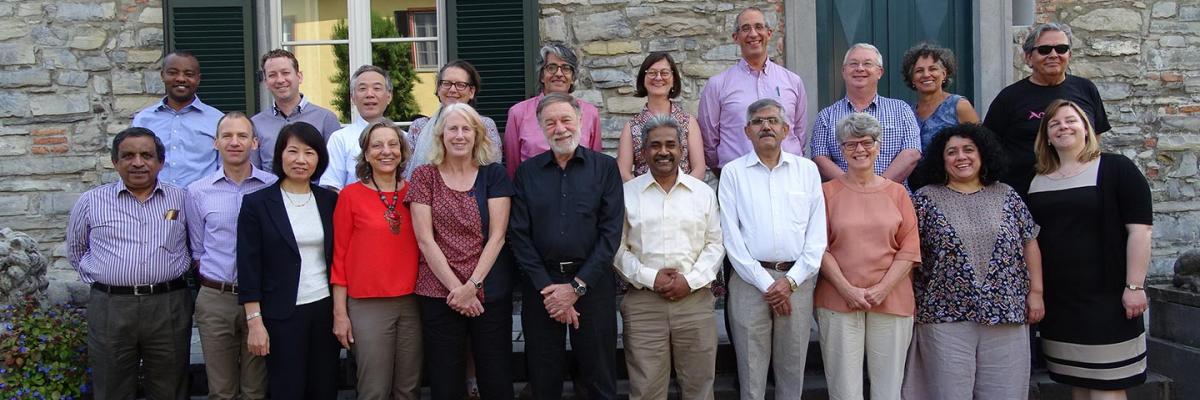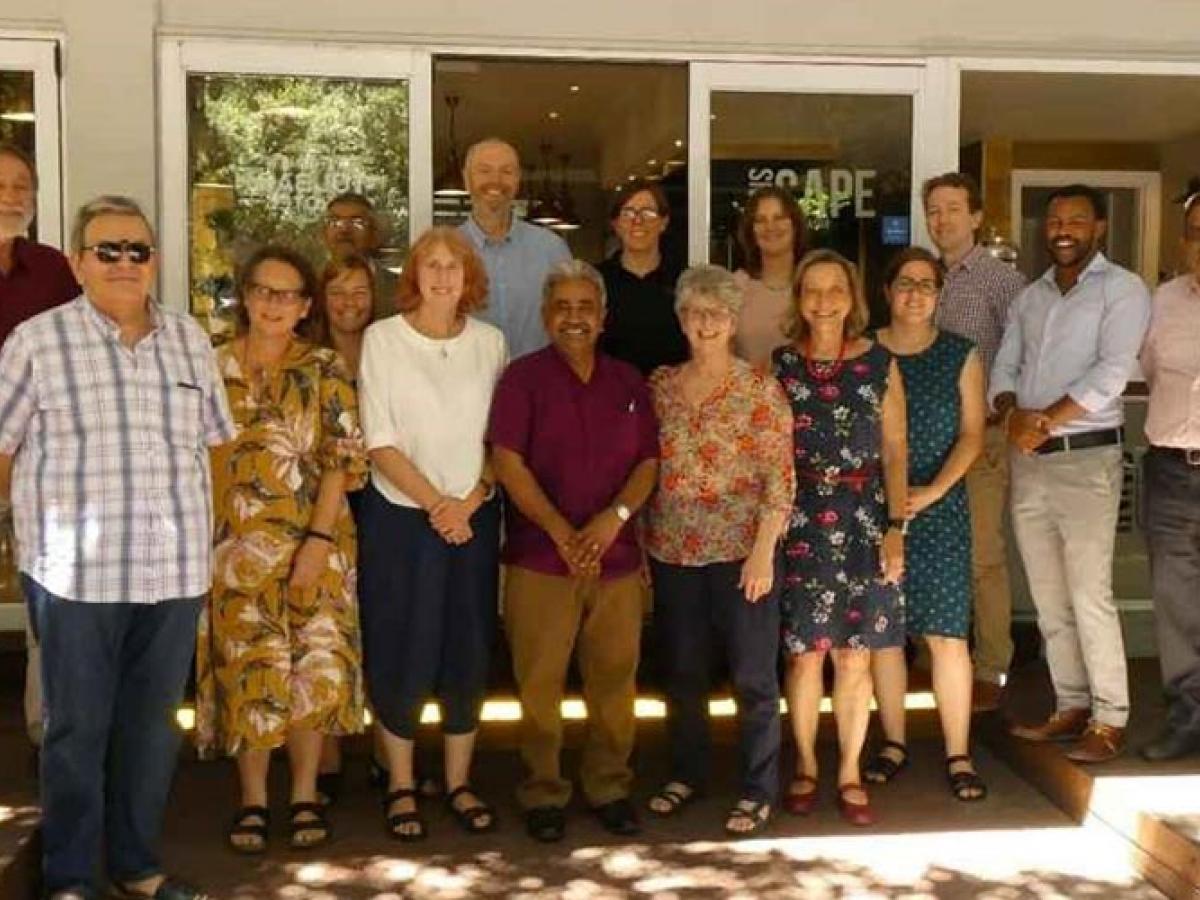Punching Above Their Weight Network

In September 2017 the Punching Above their Weight (PAW) research network was formed to advance thinking and research about why some countries do much better or much worse in terms of life expectancy than would be predicted by their economic status.
It builds on previous research that has focused primarily on health sector performance, examining more closely the political, social, environmental and economic processes that drive good or poor performance in promoting population health and health equity.
Network origins
The PAW members established the network during an international research meeting in Bellagio, Italy in late August 2017. The meeting was titled ‘Punching above their weight: Explaining why some countries have longer life expectancies than predicted by their income level’. The meeting was the result of a successful Rockefeller Foundation application, organised by Professor Fran Baum from the Southgate Institute, Flinders University and Professor David Sanders, University of the Western Cape, South Africa.
The meeting brought together 21 academics, civil society actors, and policy makers from 13 countries to design research to analyse the factors that assist a country to punch above its weight in terms of life expectancy relative to national income.
A wide range of conceptual issues and research methods were explored during the meeting, and the positive case studies of Rwanda, Vietnam, Nepal, and Spain were considered. A series of broad hypotheses were developed about how public policy action in a range of sectors may address the social, economic and political determinants of health, thereby, influencing the ability of countries to produce better than expected life expectancy relative to national income. Deeper understanding of the role of civil society in advocating for policy changes that are likely to advance health and wellbeing was also generated among the group.
The research questions and draft methodology that were developed during the meeting are now being used as a basis for multiple grant applications that will fund future work.
Available video resources:
Partnership with the South Australian Council of Social Services to test case study methodologies
Led by Professor Fran Baum, a research team from the Southgate Institute for Health, Society and Equity successfully secured a Flinders University Innovation Partnership Seed grant. In 2019 Southgate Institute researchers partnered with the South Australian Council of Social Services (SACOSS) to examine why South Australia is experiencing an increase in health inequalities and how this can be reversed in the future.
Recently published longitudinal data from the Social Health Atlas suggests that health inequities have increased Australia wide since the late 1980s, and particularly in SA. This trend is evident for almost all the health outcomes in the atlas, including: infant deaths, self-reported health, diabetes, respiratory system diseases, asthma, chronic obstructive pulmonary disease, musculoskeletal system diseases, psychological distress, and premature death. This South Australian case study is taking a mix-methods approach to understand what factors including social, political and economic have contributed to this growth in inequities.
Dr Joanne Flavel, a senior research officer at the Southgate Institute for Health, Society and Equity, Flinders University has produced a draft report drawing on publicly available data on health and health inequalities in Australia and data on the social determinants of health to provide quantitative examination of potential underlying factors that might explain the increase in socio-economic health inequalities in South Australia between the late 1980s and the period 2011-2015.
-
Findings from our case study
The Heaps Unfair State: Why have health inequities increased in South Australia and how can this trend be reversed?
SA: The Heaps Unfair State report - produced by the Southgate Institute for Health, Society and Equity at Flinders University and the South Australian Council of Social Service (SACOSS) - provides evidence that shows a significant increase in inequities in South Australia since the 1980s and also recommends how to improve this state’s health outcomes. The report’s raft of almost 40 recommendations stretches across the fiscal, education, energy, health, public service, social security, housing, digital, employment, NGO, rural and regional sectors.
- SA The Heaps Unfair State final report
- SA: The Heaps Unfair State summary report
- SA: The Heaps Unfair State statistical report
- SA: The Heaps Unfair State Report Launch Presentations full video
- SA: The Heaps Unfair State Report Launch: Recommendation and NGO Perspective, Ross Womersley CEO, South Australian Council of Social Service
- SA: The Heaps Unfair State Report Launch: Overview of Health Equity and Research Findings Professor, Fran Baum, Flinders University
- SA: The Heaps Unfair State Report Launch: Global Perspective on Health Equity Professor, Ron Labonte University of Ottawa, Canada
-
4th People's Health Assembly - Savar Bangladesh
Southgate Institute researchers and Punching Above their Weight Network members were among the 1400 civil society activists, researchers, government and health workers who attended the People’s Health Movement’s 4th People’s Health Assembly in Savar, Bangladesh, 15-19 November 2018. During the Assembly Dr Halfdan Mahler, former Director General of WHO and one of the founders of the 1978 Alma Ata Declaration on Primary Health Care, reaffirmed his vision that “Health is not a commodity, but a universal right”.
Professor Fran Baum, presented in a plenary session on the social and physical environments that destroy or promote health. A key argument that ran through Prof Baum’s presentation (and many others) was the need to put people before profits. This includes challenging the neoliberal capitalist policies that have dominated governance globally for over four decades, causing widening wealth and health inequities. In contrast to profit driven health services, the Assembly emphasised the need to revitalise primary health care to facilitate universal provision.
Prof Baum, Connie Musolino and other PAW network members David Sanders, Nikki Schaay, Mark Limmer, Kedar Baral and Simrin Kafle ran a workshop on why some countries do well or badly in terms of life expectancy relative to their GDP. Focusing on case studies on South Africa and Nepal the workshop highlighted the importance of looking beyond just economic development, to the social, political and environmental determinants as factors contributing to better health outcomes. Drawing on participation from the audience, the workshop discussed civil society participation and community empowerment as a key determinant of health.
-
PAW meeting, Cape Town, South Africa

In February 2019 members of the international Punching Above Their Weight research network met in Cape Town, South Africa, funded by a UK Health Challenge grant. The meeting was attended by 16 participants from 8 nations. Fran Baum, Toby Freeman, Toni Delany-Crowe, and Connie Musolino represented Southgate, and Hailay Gesesew represented Public Health, Flinders University. The meeting focussed on advancing thinking and research about the social, political, economic and environmental factors that lead some countries to produce better or worse population life expectancy than would be predicted by their economic status.
Multiple jurisdictions were examined as case studies, including Spain, Ethiopia, Brazil, South Australia, Nepal, Sri Lanka and several Indian states. The discussions at the meeting extend previous research that focused primarily on health sector performance, rather than other social determinants that provide a foundation for population health and health equity.
The outcomes of the meeting will include two funding applications to extend the work of the Network, as well as several research papers based on presentations delivered during the meeting.
Baum, F. et al (2018) ‘Punching above their weight: a network to understand broader determinants of increasing life expectancy’. International Journal for Equity in Health, 17(117), Doi -
Executive and members
Executive
- Prof Fran Baum - Director, Stretton Health Equity, Stretton Institute, University of Adelaide, Member People’s Health Movement Global Steering Council
- Prof Jennie Popay - Professor of Sociology and Public Health at the Division of Health Research, Lancaster University
Members
- Prof Carlos Alvarez-Dardet - Professor of Public Health and Director of the Observatory of public policies and health, Center for Research in Epidemiology and Public Health, University of Alicante
- Dr Vinya Ariyaratne - General Secretary of the Sarvodaya Shramadana Movement of Sri Lanka
- Prof Clare Bambra - Professor of Public Health, Institute of Health & Society, Newcastle University
- Prof Kedar Baral - Department of Community Health Sciences, School of Medicine, Patan Academy of Health Sciences, Nepal
- Dr Paulin Basinga - Deputy Director of Integrated Delivery Country Primary Health Care. Bill and Melinda Gates Foundation
- Dr Mary Bassett - Commissioner of the New York City Department of Health and Mental Hygiene
- Prof David M Bishai - Population, Family, and Reproductive Health, Johns Hopkins University
- Dr Mickey Chopra - Lead Service Delivery Specialist, World Bank
- Dr Joanne Flavel - Research Fellow, Stretton Health Equity, Stretton Institute, University of Adelaide
- Dr Toby Freeman - Senior Research Fellow, Stretton Health Equity, Stretton Institute, University of Adelaide
- Prof Sharon Friel - Director School of Regulation and Global Governance (RegNet) and Professor of Health Equity, ANU College of Asia and the Pacific. Australian National University
- Dr Hailay Gesesew - NHMRC Senior Research & Teaching Fellow at Torrens University Australia
- Prof Elsa Giugliani - School of Medicine, Department of Pediatrics and Child Care, Federal University of Rio Grande do Sul
- Prof Hideki Hashimoto - Health Economics and Epidemiology Research, School of Public Health, University of Tokyo
- Dr Mark Limmer - Lecturer in Public Health, Division of Health Research, Lancaster University
- Prof James Macinko - Department of Community Health Sciences and Department of Health Policy and Management, University of California
- Prof Martin McKee - London School of Hygiene and Tropical Medicine, Professor of European Public Health
- Dr Connie Musolino - Research Fellow, Stretton Health Equity, Stretton Institute, University of Adelaide
- A/Prof Huong Thanh Nguyen - Faculty of Social Sciences, Hanoi School of Public Health
- Ms Nikki Schaay - Senior Researcher, School of Public Health, University of the Western Cape
- A/Prof Orielle Solar - Doctor. Researcher at The Latin American Faculty of Social Sciences (FLACSO). Assistant Professor at School of Public Health, Faculty of Medicine, University of Chile
- Dr Sundararaman (Sundar) Thiagarajan - Dean, School of Health Systems Studies, Tata Institute of Social Sciences Mumbai
- Nicole Valentine - Senior Technical Officer, Department of Public Health, Environmental and Social Determinants of Health, World Health Organisation
